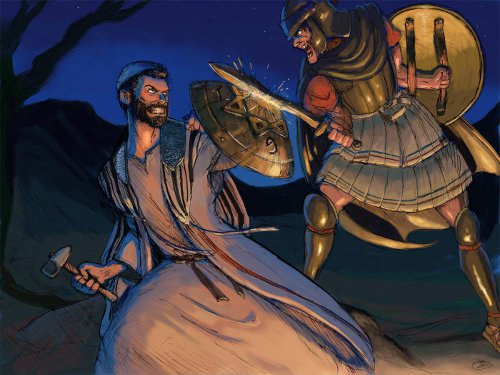 Iran’s Attack on Israel
Iran’s Attack on Israel


7 min read
A look at some of the Jewish elements – coincidental or otherwise – of Star Wars.
A long time ago in a place far, far away...
It is a period of civil war. A new government has declared the practice of the old faith a crime punishable by death, disbanding an ancient order of sages and sending many into exile. Rebel fighters, striking from a hidden base, have won their first major victory against the evil Empire, stirring a spirit of defiance among the populace. Outarmed and vastly outnumbered, the ragtag band of rebels – aided by an all-powerful, all-permeating Force that binds together all life in the universe – remain the only hope for restoring peace and freedom to their people.
It's one of the greatest epics known to mankind. No, not Star Wars. The above synopsis is actually the story of Hanukkah, the eight-day Jewish festival that commemorates a miraculous victory of Israelite insurgents against the tyrannical Seleucid Empire roughly 2,200 years ago.
With Star Wars Episode VII set to premiere in just a few short weeks, I got to thinking about how certain aspects of the Star Wars universe are eerily similar to the history, beliefs, and teachings of the Jews. Now George Lucas did not set out to create a fantasy universe full of Jewish references, but the connections are nevertheless there. So let's put the “Han” back in Hanukkah (Harrison Ford, by the way, technically a member of the tribe) and look at some of the Jewish elements – coincidental or otherwise – of Star Wars.
The heroes of the Star Wars series are members of a “rebel alliance,” basically Maccabees in outer space. It's right there in the name: Jedi. The Hebrew letter yud is often anglicized as a “J,” and syllables occasionally get dropped in translation. Hence, a Biblical name like “Yehoshua” makes its way into English as “Joshua.” It's not much of a stretch to see how “Jedi” can be derived the original Hebrew word for Jew, “Yehudi.”
 Remember Luke Skywalker's Jedi rebbe, Grand Master Yoda? Is it just me, or is his peculiar syntax reminiscent of someone whose first language is Yiddish (“Yodish”)? More to the point, his name sounds a lot like “yada,” the Hebrew word meaning “to know.”1
Remember Luke Skywalker's Jedi rebbe, Grand Master Yoda? Is it just me, or is his peculiar syntax reminiscent of someone whose first language is Yiddish (“Yodish”)? More to the point, his name sounds a lot like “yada,” the Hebrew word meaning “to know.”1
And how about those Skywalkers? Luke Skywalker might sound like a gentile name, but that name was clearly chosen to alliterate with his twin sister Leia (Leah). Also keep in mind that their parents were an interfaith couple. The father, Anakin Skywalker, played by the unmistakably un-Jewish Hayden Christensen, tried to convert to Jediism, but as we know he ultimately turned to the Dark Side instead. Their mother was Queen Amidala, portrayed by the beautiful and talented Israeli-born actress Natalie Portman. Suffice it to say their marriage did not end well, and it wasn't until much later in life that their children discovered their Jedi-ish identity.
When an aspiring Jedi Knight goes to the Academy, he or she must complete what is essentially an apprenticeship with one more learned in Jediism than they are. Similarly, a future rabbi's yeshiva experience will consist largely of chavruta learning (studying with a partner – lit. “friendship”). Fun fact: The name for a young, unmarried yeshiva student, “bochur,” actually means “chosen” (as in “The Chosen People”). The idea of a foretold “Chosen One” who would “restore balance to the Force” was a theme running throughout the Star Wars films, wherein Anakin Skywalker was recognized for his extraordinary potential as a Jedi. As mentioned above, he went “off the derech” and became the villainous Darth Vader. In Return of the Jedi, however, Vader/Skywalker fulfills the “prophecy” when he does teshuvah (our term for repentance, which literally means “return.” Whoa. Return of the Jedi!), thwarting Emperor Palpatine to save his son's life, and ultimately, the galaxy.
Of course, if you tell a young rabbi-in-training that he is the “Chosen One,” it sounds cool and dramatic and is technically true, but then, the same can be said of all of his classmates.
While the Star Wars films don't feature Jedi trainees delving into sacred texts (it doesn't make for the most exciting movie montage), some of the greatest rabbinic books of ethics and Jewish philosophy would be right at home in any Jedi library. “Duties of the Heart,” “The Path of the Just”....tell me these don't sound like the reading list for a hero of the Light Side.
While Jediism isn't a theistic religion per se, its practitioners do teach of a Force that, in the words of Reb Obi-Wan Kenobi "...is what gives a Jedi his power. It's an energy field created by all living things. It surrounds us and penetrates us; it binds the galaxy together." That almost sounds like some sort of Chasidic teaching – just replace “energy field” with “entity” or “consciousness,” and “created by,” with “that creates,” and what you have starts to come across less like new age hippie talk and more like an introduction to Kabbalah, Jewish mysticism.
One idea that devout Jews of all stripes share, is that God, the creative “Force” that sustains all, is the source of a Jew's power. “Ein od milvado,” there is none besides Him. The Jew expresses his or her connection to the universe by striving for an ever closer relationship with its Creator.
Another aspect of Jedi belief is the notion of balance, the idea that the Light Side and the Dark Side are both aspects of the same Force seeking equilibrium. The religions that branched off from Judaism tend to show the Creator and Satan, or “The Devil,” in an adversarial relationship, almost a sort of de facto dualistic theology with a God and an anti-God, if you will. Judaism maintains that the Satan (lit. “Accuser”) is the angel associated with temptation, and prosecution in the Heavenly Court. He's basically Slugworth to God's Willy Wonka. He's got a dirty job to do, but in the end, we're both serving the same Boss.
Judaism also teaches that the source of Light and Darkness are One and the same, as it says in the prayer book: “Blessed art Thou, Lord our God, King of the Universe, Who forms light and creates darkness, Who makes peace and creates all things.” The source for this line of liturgy can be found in the Hebrew Bible, Isaiah 45:7: “Who forms light and creates darkness, Who makes peace and creates evil; I am the Lord, Who makes all these.”
Incidentally, one of the traditional names for God – invoked particularly by the Jewish mystics – is HaMakom, literally “The Place.” The deeper idea conveyed by this name is that the Creator does not exist within the universe; the universe exists within Him. It sounds a lot like The Force. The key conceptual difference between the fictitious all-uniting Force of Star Wars and the Shechinah or “Divine Presence” is that the former is impersonal and passive, the latter is an omnipotent consciousness that actively intervenes in human history, speaking with Prophets and working miracles until this very day.
So if you see the new Star Wars movie, directed by Jeffrey Jacob Abrams (who couldn't sound more Jewish if his name was Saul Cohen or Herschel Rosenblatt), perhaps you'll be able to seek out and appreciate the surprisingly Jewish flavor of the Star Wars universe.
Check out my crowdfunding campaign for a graphic novel based on the true story of the Hasmonean Revolt. Just click here. You can also follow our progress at Facebook.com/Maccabaeus.
Happy Hanukkah, and may the Force be with you!
 In the upcoming graphic novel Maccabaeus, Judah and his brother, the Je(hu)di rebels of their generation, do battle with Seleucid Imperial troops.
In the upcoming graphic novel Maccabaeus, Judah and his brother, the Je(hu)di rebels of their generation, do battle with Seleucid Imperial troops.
1. Singular masculine conjugation: yodea
* Art by Mark Strauss
